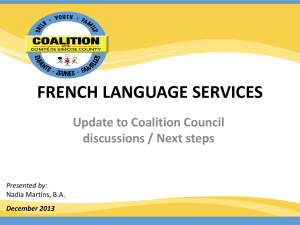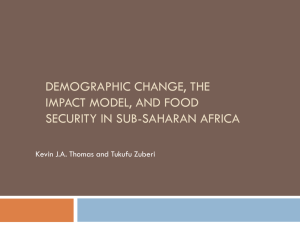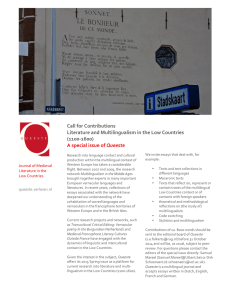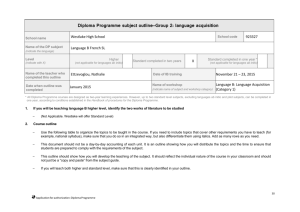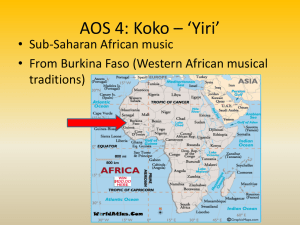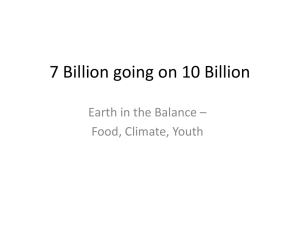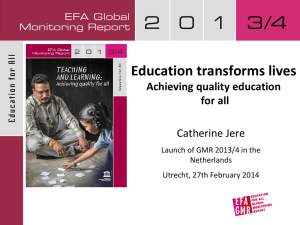Version 27th April
advertisement
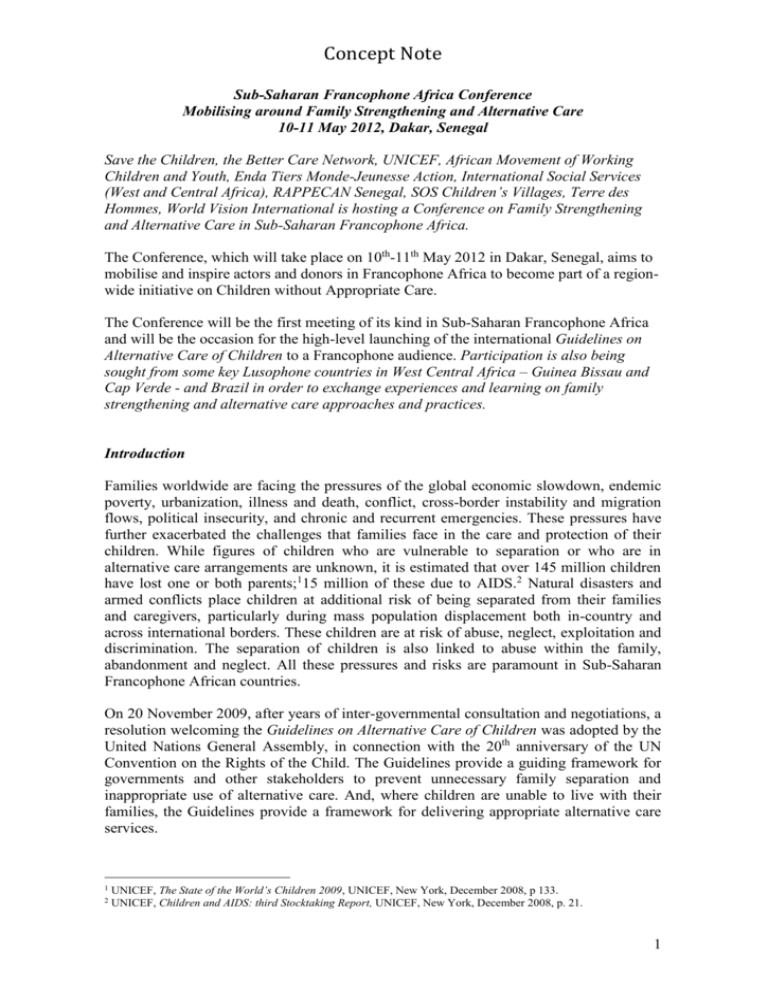
Concept Note Sub-Saharan Francophone Africa Conference Mobilising around Family Strengthening and Alternative Care 10-11 May 2012, Dakar, Senegal Save the Children, the Better Care Network, UNICEF, African Movement of Working Children and Youth, Enda Tiers Monde-Jeunesse Action, International Social Services (West and Central Africa), RAPPECAN Senegal, SOS Children’s Villages, Terre des Hommes, World Vision International is hosting a Conference on Family Strengthening and Alternative Care in Sub-Saharan Francophone Africa. The Conference, which will take place on 10th-11th May 2012 in Dakar, Senegal, aims to mobilise and inspire actors and donors in Francophone Africa to become part of a regionwide initiative on Children without Appropriate Care. The Conference will be the first meeting of its kind in Sub-Saharan Francophone Africa and will be the occasion for the high-level launching of the international Guidelines on Alternative Care of Children to a Francophone audience. Participation is also being sought from some key Lusophone countries in West Central Africa – Guinea Bissau and Cap Verde - and Brazil in order to exchange experiences and learning on family strengthening and alternative care approaches and practices. Introduction Families worldwide are facing the pressures of the global economic slowdown, endemic poverty, urbanization, illness and death, conflict, cross-border instability and migration flows, political insecurity, and chronic and recurrent emergencies. These pressures have further exacerbated the challenges that families face in the care and protection of their children. While figures of children who are vulnerable to separation or who are in alternative care arrangements are unknown, it is estimated that over 145 million children have lost one or both parents;115 million of these due to AIDS.2 Natural disasters and armed conflicts place children at additional risk of being separated from their families and caregivers, particularly during mass population displacement both in-country and across international borders. These children are at risk of abuse, neglect, exploitation and discrimination. The separation of children is also linked to abuse within the family, abandonment and neglect. All these pressures and risks are paramount in Sub-Saharan Francophone African countries. On 20 November 2009, after years of inter-governmental consultation and negotiations, a resolution welcoming the Guidelines on Alternative Care of Children was adopted by the United Nations General Assembly, in connection with the 20th anniversary of the UN Convention on the Rights of the Child. The Guidelines provide a guiding framework for governments and other stakeholders to prevent unnecessary family separation and inappropriate use of alternative care. And, where children are unable to live with their families, the Guidelines provide a framework for delivering appropriate alternative care services. 1 2 UNICEF, The State of the World’s Children 2009, UNICEF, New York, December 2008, p 133. UNICEF, Children and AIDS: third Stocktaking Report, UNICEF, New York, December 2008, p. 21. 1 Concept Note The Guidelines, along with other provisions of international law3 and the growing body of evidence-based research, 4 clearly outline the children’s right to protection and care in their family. Despite this legal and evidence-based imperative, children continue to be unnecessarily separated from families and inappropriately placed in often unregulated alternative care throughout Sub-Saharan Francophone African countries. Reports have shown that in many countries few mechanisms exist to ensure that appropriate support is given to the most vulnerable families caring for children, and that alternative care options are often not in line with international guidance. Foster care is rarely available as an option for children and families. Social services that trace extended family and ensure appropriate, safe placements for children are in short supply. In the absence of family support services, foster care, and coordinated tracing of extended kin, unregulated institutions end up housing children who otherwise could be raised in a family and often channelling them away from their country of birth via intercountry adoption. This is not only crippling the potential and limiting the future of millions of children; it is also restricting national economic, political, and social growth. The proposed Conference will build on the discussions and commitments of recent regional and international conferences on alternative care, most notably: the First International Conference in Africa on Family-Based Care for Children held in Nairobi, Kenya, in September 2009 and the conference The Neglected Agenda: Protecting Children without Adequate Parental Care held at the Wilton Park international conference centre in the United Kingdom in December 2009.5 Situation Analysis: Positive Developments and Challenges in Sub-Saharan Francophone African Countries Across Sub-Saharan Francophone Africa, networks, working groups, international agencies and local and international NGOs have been working on the issue of children without adequate family care. Some countries and communities have come up with their own innovative models of caring for vulnerable children; while others are still struggling due to lack of resources, understanding of the issues, capacity, data, and policies and laws. There are a number of positive developments and experiences in the region to build on. These include significant country-based efforts to map and analyze national child protection systems in the Democratic Republic of Congo, Cote d’Ivoire, Niger, Mali, Senegal and Mauritania; increased collaboration between Child Protection, HIV/AIDS and Social Welfare ministries and agencies on the issue of orphans and vulnerable children and social protection in order to develop a common framework for social Article 9 of the United Nations Convention of the Rights of the Child (UNCRC), for example, states: “States Parties shall ensure that a child shall not be separated from his or her parents against their will, except when competent authorities subject to judicial review determine, in accordance with applicable law and procedures, that such separation is necessary for the best interests of the child.” 4 Family-based care is safer and provides higher development outcomes for children, particularly young children. Research has shown that young children raised in institutions, for example, are vulnerable to neglect and abuse, emotional and severe behavioural problems, health complications, and cognitive and physical development setbacks. Refer to BCN website for resources and reference. 5 Both conferences called for more regional level networking and exchange around this issue area. For more information regarding these conferences visit Better Care Network website, www.bettercarenetwork.org 3 2 Concept Note welfare and protection of vulnerable children; investments in national deinstitutionalization programs; and, notable investments in community based child protection mechanisms to protect and respond to children in their communities. Significant challenges and barriers for action, however, remain present. Although some statistics are available from select countries, little is known about the care status of children in the region. Furthermore, significant risk factors associated with children and alternative care exist in the region, including high levels of poverty, limited educational opportunities, HIV/AIDS, discrimination and several emergency situations. In terms of response, social welfare human resources and capacity in the region are weaker than in some other regions, resulting in inadequate regulatory frameworks, gatekeeping, alternative care policies, laws and strategies, and national monitoring of children. There is limited access to French-language resources on alternative care, including assessments, best practices, tools, trainers and other support services. In general, national and regional level networking on alternative care issues requires strengthening across Francophone African countries. Thus, it has never been timelier for Sub-Saharan Francophone countries to share their experiences and raise awareness on the issue of children without adequate family care. Objectives of the Sub-Saharan Francophone Conference on Family Strengthening and Alternative Care Save the Children, the Better Care Network, UNICEF, African Movement of Working Children and Youth, Enda Tiers Monde-Jeunesse Action, International Social Services (West and Central Africa), RAPPECAN Senegal, SOS Children’s Villages, Terre des Hommes, World Vision International are hosting a high level Conference on Family Strengthening and Alternative Care on 10th-11th May 2012 in Dakar, Senegal. It will be the first event of its kind in the region and will provide an opportunity to mobilise key actors to: Promote the international Guidelines on Alternative Care of Children, their dissemination and use and their adoption and implementation in countries across the region Make the care situation of children without appropriate care in Sub-Saharan Francophone Africa more visible Share experiences, examples of good practices and lessons learned in supporting family-based care across the region Identify the specific nature of care issues across the region and the priority requirements to address them Launch an alternative care platform for Sub-Saharan Francophone Africa countries and determine opportunities for future information exchange, coordination, and collaboration between different Francophone and Lusophone child protection actors In particular, this conference will build on the recommendations of recent regional and international conferences on alternative care and will set the stage for the development of concrete plans to adopt and implement the international guidelines in countries throughout Francophone Sub-Saharan Africa. 3 Concept Note Conference on Family Strengthening and Alternative Care: Content and Format Dates and Venue: The Conference will take place on 10th-11th May 2012 in Dakar, Senegal and will be conducted in French and Portuguese. It will directly follow the Conference on Strengthening National Child Protection Systems in Sub-Sahara Africa which will also take place in Dakar from 7th-9th May 2012. This will help to ensure the continued participation of key government and NGO counterparts. Both conferences will also provide an opportunity to discuss the linkages with child protection systems and the role that alternative care can play in strengthening this system. Background Paper: A Background Paper on the situation of family support services and alternative care in Francophone, Lusophone and Anglophone countries in Sub-Saharan Africa has been commissioned. This paper will serve as a guide for country delegations prior to the Conference as well as providing the framework for the issues to be discussed during the conference and as part of the sustained follow up. The Background Paper provides conference participants with an actual overview of the state of care and care systems in the region, as far as information has been available. It also provides case studies of promising models of alternative family or community-based care which will be showcased during the conference. Conference Format: The Conference will include inspirational high-profile speakers and presentations on the need and possibilities for raising the profile of alternative care within the Sub-Saharan Francophone African community, on good practices and successful strategies and on the international Guidelines for the Alternative Care of Children as a key legislative framework to be implemented at regional and national levels. The Conference will further provide an opportunity for children and young people in Sub-Saharan Francophone Africa to dialogue directly with actors and donors on their experiences of and perspectives on alternative care. Interactive sessions will allow for further networking and facilitated discussions. The organizers will work with Francophone and invited Lusophone countries to identify innovative interventions and practices in the area of alternative care for children and networking or collaborative efforts. The regional organising committee will work with their regional and national communication teams to ensure that there is comprehensive media coverage of the event. Key themes to be discussed at the conference will include: (1) De-institutionalisation – approaches, experiences, successes and challenges, including the legislative and policy environment 4 Concept Note (2) Community Child Protection Mechanisms – showcasing the mechanisms, promising strategies and practices in the provision of family-based alternative care (3) Family Strengthening – the reality of the family and its place in the care and protection of children, experiences and lessons learned from improving knowledge, skills and capacity for supporting family-based care Conference Participants Conference participants will be drawn from around 20 Sub-Saharan Francophone and Lusophone Africa countries. The 75 participants will include representatives from: government ministries and departments, donor agencies, research institutions and universities, faith-based organizations, youth networks, international and national nongovernmental organizations, private foundations, academia and UN agencies. The regional organising committee will work with country stakeholders to identify participants from each country. Conference Regional Organization Committee The conference is being convened and organised by a regional organisation committee. Save the Children Better Care Network UNICEF ENDA Tiers Monde-Jeunesse Action International Social Services (West and Central Africa) Mouvement Africain des Enfants et Jeunes Travailleurs (MAEJT) RAPPECAN Senegal SOS Children’s Villages Terre des Hommes World Vision 5 Concept Note Annex A: Sub-Saharan Francophone-Lusophone Africa – list of participating countries Benin Burkina Faso Burundi Cameroon Cape Verde Central African Republic Chad Congo (Brazzaville) Cote d’Ivoire Democratic Republic of Congo Gabon Guinea Bissau Guinea Conakry Madagascar Mali Mauritania Niger Rwanda Senegal Togo Brazil 6
